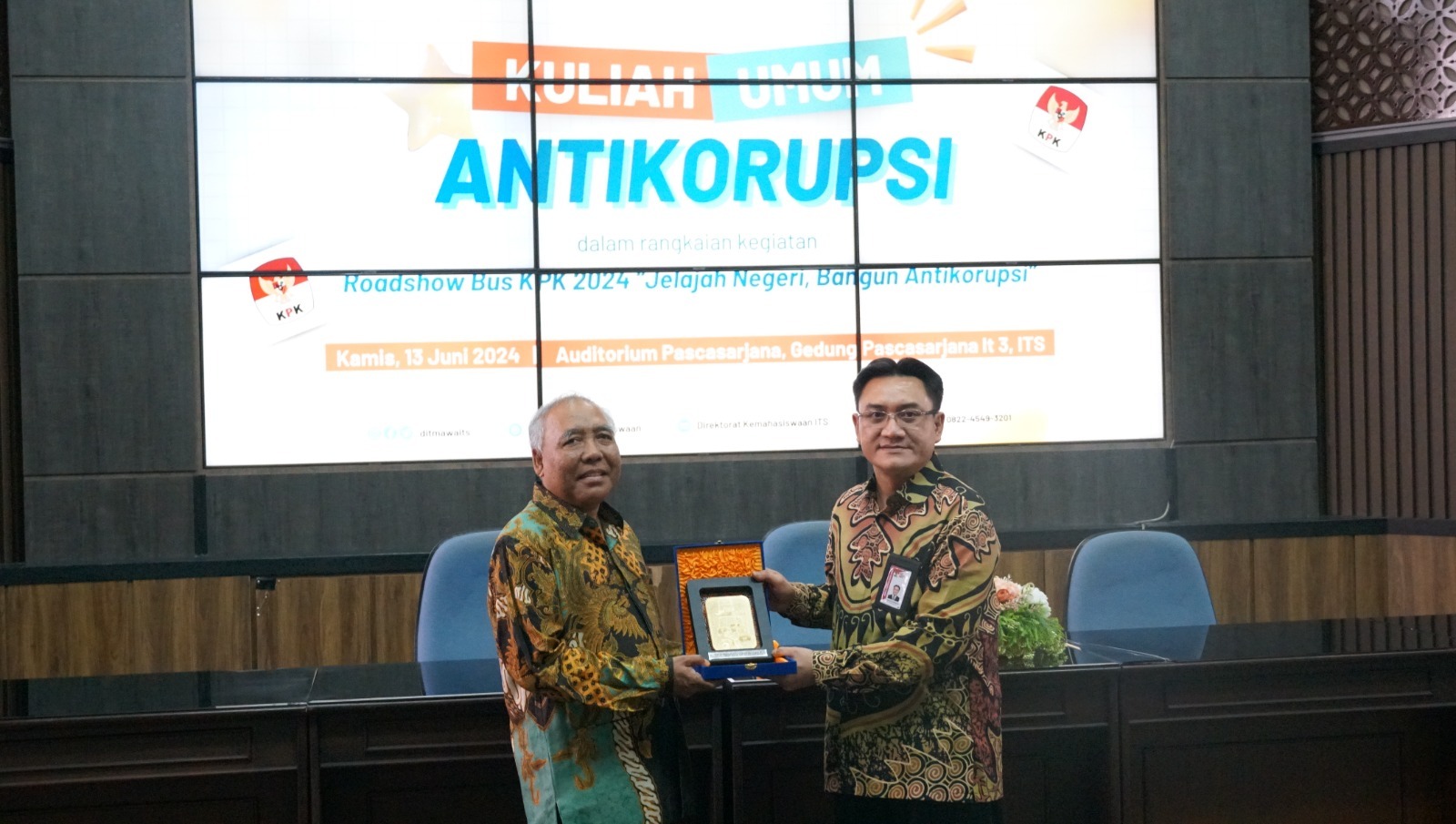Intensifying Anti-Corruption, KPK Gives Public Lecture at ITS

ITS Vice Rector I Prof Dr Ir Adi Supriyanto MT (left) with the Head of the Secretariat for Education and Community Participation of KPK Guntur Kusmeiyano when handing over souvenirs
ITS Campus, ITS News — To fight corruption, the Corruption Eradication Commission (KPK) held a Youth, Integrity, and Anti-Corruption Public Lecture for the students of Institut Teknologi Sepuluh Nopember (ITS) on Thursday (13/6). The event entitled “Anti-Corruption and the Development of an Integrity Culture in the ITS Environment,” occurred at the ITS Postgraduate Building.
This public lecture is part of a program to prevent the long chain of corruption in Indonesia. To increase public awareness in the fight against corruption, KPK must concretely interact and be present in the community. This effort is to build trust and educate the public on the importance of a culture of integrity.
The Head of the Secretariat for Education and Community Participation at KPK, Guntur Kusmeiyano, explained that this public lecture is part of the 2024 Anti-Corruption Bus Roadshow activities. “This program targets students to develop good character as preparation before entering the workforce,” Guntur said.
Furthermore, Guntur emphasized that disgraceful behavior such as corruption grows when unethical practices and indiscipline are normalized. Eventually, these habits will develop into actions that harm human rights (HAM) and lead to corrupt behavior. “Therefore, it is necessary to instill a sense of discipline in students, such as avoiding proxy attendance, plagiarism, and cheating,” he reminded.
As part of the university’s tridharma, academics need to make significant contributions to the eradication of corruption. This can be done through community service activities incorporated into thematic anti-corruption Field Work Lectures (KKN). Education should also include creative anti-corruption materials and the establishment of anti-corruption study centers. Therefore, students are invited to contribute to eradicating corruption in various ways. “Actively developing and utilizing technology, becoming content creators, and conducting anti-corruption research,” Guntur explained.
According to Guntur, corruption is based on various factors, commonly known as the Fraud Pentagon. The five key factors are rationalization, arrogance, capability, opportunity, and pressure. An example of rationalization is when someone has worked with a typewriter for a long time and thinks about having it at home. Another example is pressure, whether from internal partners or family or external factors that drive corrupt actions.

The Head of the Secretariat for Education and Community Participation at KPK, Guntur Kusmeiyano, explained that the Anti-Corruption Perception Index (IPAK) is higher among urban communities compared to rural communities
It should be noted that there are 30 types of corruption crimes (tipikor) that can be categorized into seven major groups. The most common types of corruption include gratuities, bribery, and extortion. Gratuities are closely related to positions and often involve acts of good faith that are not based on any agreement.
This practice of gratuities frequently occurs and must be rejected and reported. “If you receive items that are indicated to be gratuities, they can become bribes if left unreported,” the bespectacled man emphasized.
However, not all gifts can be categorized as gratuities. As long as the gift is seen as a form of expression and hospitality, it is not mandatory to report it. Additionally, gifts are sometimes viewed within the context of customs, traditions, and norms that are prevalent in society. If a gratuity is not returned or reported within 30 working days, it can be considered a form of bribery.
In line with KPK’s goal of conducting anti-corruption public lectures, ITS Vice Rector I for Academic and Student Affairs, Prof Dr Ir Adi Supriyanto MT, also hopes that Indonesia can overcome this disease that hinders the nation’s progress. Therefore, it is essential to cultivate anti-corruption youth with an entrepreneurial spirit so they can lead the nation appropriately. “The future of the nation will be better if it is free from corruption,” he concluded, hopefully. (ITS Public Relations)
Reporter: Silvita Pramadani
Translator: Alya Farah Nabila
Related News
-
ITS Collaboration with BPBD East Java, Launching VR Disaster Simulation
ITS Campus, ITS News — Supporting anticipation of disasters and continuing to educate the public, Institut Teknologi Sepuluh Nopember
June 13, 2024 21:06 -
Supporting the Implementation of Innovative Ideas, ITS and IYSA Hold International Competition
ITS Campus, ITS News — Institut Teknologi Sepuluh Nopember (ITS) has once again proven its commitment to supporting the
June 13, 2024 21:06 -
ITS Maintains Informative Qualification for Five Consecutive Years at KIP Awards
ITS Campus, ITS News — Institut Teknologi Sepuluh Nopember (ITS) has once again successfully maintained its Informative Qualification predicate
June 13, 2024 21:06 -
ITS Strengthens Smart Eco-Campus through UI GreenMetric 2024
ITS Campus, ITS News — Institut Teknologi Sepuluh Nopember (ITS) has once again demonstrated its commitment to environmental concern
June 13, 2024 21:06
